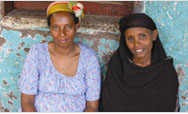The women of the Obi and Garaku villages in Nigeria had toiled for years to make ends meet on their cooperative farms. Organized in small 25-member cooperatives and engaged mainly in soybean production and processing, the women were using most of the products such as soy milk, soybean flour, soybean soup, and soybean “kunu” (a local beverage) for household consumption. The remaining crop was sold unprocessed at low prices due to lack of knowledge about processing and utilization for commercial purposes.
USAID’s Farmer to Farmer program, administered by Winrock International, helped the women improve their production and marketing of soybeans. Farmer to Farmer volunteers Dr. Julie Albrecht and Dr. Georgia Jones from the University of Nebraska at Lincoln traveled to Nigeria in early 2002 to show the women how to add value to the soybeans by roasting, mixing them with granola, and marketing them as a snack food. This method for selling soybeans has increased incomes for some farmers in Garaku as well as demand, which has fueled a production increase of 60% in Obi.
The cumulative effects of volunteer assistance are improved processing and utilization of soybeans, better nutritional status of families, and increased incomes. In addition to sharpening the business skills of cooperative members, the program has contributed to development in Nigeria by strengthening grassroots organizations, which are the building blocks of democracy.
|


